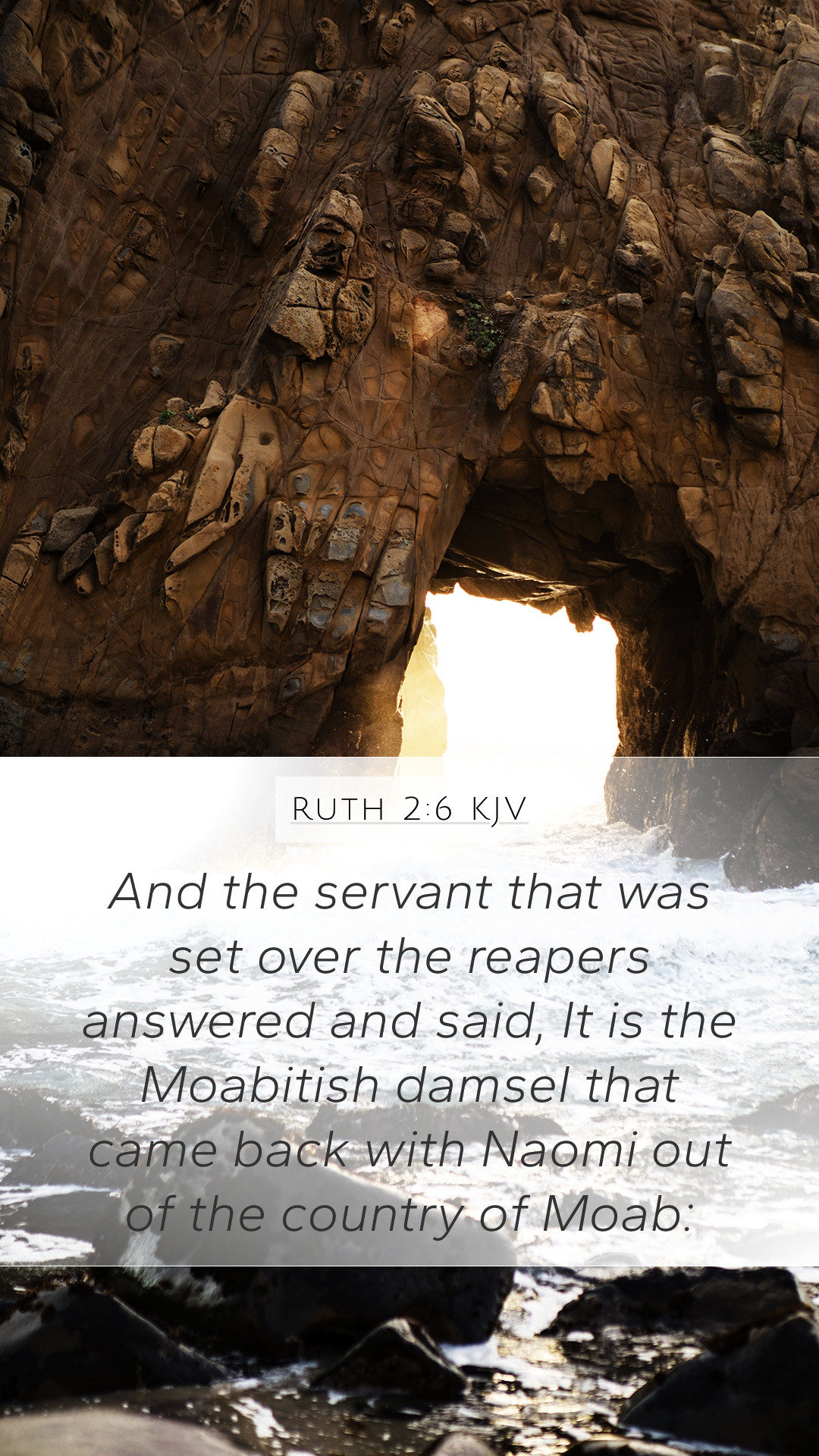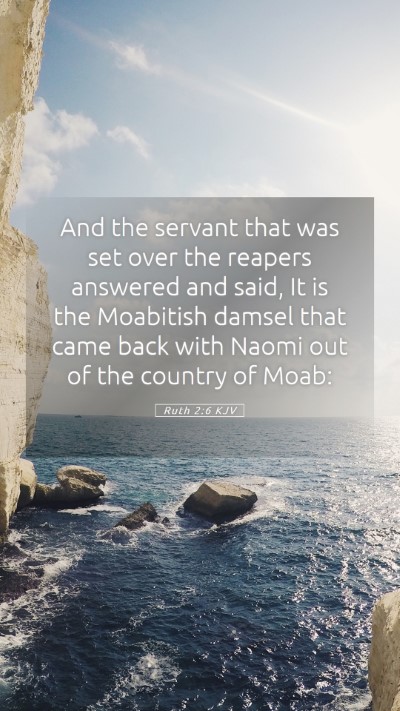Old Testament
Genesis Exodus Leviticus Numbers Deuteronomy Joshua Judges Ruth 1 Samuel 2 Samuel 1 Kings 2 Kings 1 Chronicles 2 Chronicles Ezra Nehemiah Esther Job Psalms Proverbs Ecclesiastes Song of Solomon Isaiah Jeremiah Lamentations Ezekiel Daniel Hosea Joel Amos Obadiah Jonah Micah Nahum Habakkuk Zephaniah Haggai Zechariah MalachiRuth 2:6 Meaning
What is the meaning of Ruth 2:6?
And the servant that was set over the reapers answered and said, It is the Moabitish damsel that came back with Naomi out of the country of Moab:
Ruth 2:6 Bible Verse Meaning
Bible Verse Meaning and Commentary for Ruth 2:6
This analysis aims to provide a comprehensive understanding of Ruth 2:6, drawing upon public domain commentaries from esteemed theologians such as Matthew Henry, Albert Barnes, and Adam Clarke. Our focus is to explore the meanings, interpretations, and significance of this verse within its biblical context, catering to those searching for bible verse meanings, bible verse interpretations, and more.
Understanding Ruth 2:6
In Ruth 2:6, the verse states, "And the servant that was set over the reapers answered and said, It is the Moabitess damsel that came back with Naomi out of the country of Moab." This simple yet profound statement encapsulates several themes central to the Book of Ruth, a narrative rich with redemption, loyalty, and divine providence.
Context and Background
The Book of Ruth is situated during the time of the judges in Israel, a period characterized by social and moral upheaval. Ruth, a Moabite woman, decides to stay with her mother-in-law Naomi after the death of her husband, showcasing steadfast loyalty. This choice sets the stage for her eventual redemption and inclusion in the lineage of David and ultimately, Christ.
Verse Interpretation
- Identity and Inclusion: The servant identifies Ruth as "the Moabitess damsel," emphasizing her ethnicity and status as an outsider in Israelite society. Matthew Henry notes that this identification underscores the remarkable nature of Ruth's acceptance— her foreign status does not hinder God's blessing upon her.
- God’s Providence: Albert Barnes remarks on the significance of Ruth's return to Bethlehem with Naomi, viewing it as providential. God's hand is evident as He leads Ruth to the fields of Boaz, her kinsman-redeemer, showcasing how He orchestrates events for His purposes.
- Servanthood and Community: Adam Clarke elaborates on the role of the servant who speaks about Ruth. His acknowledgment of her presence signifies the importance of community in God's plan, reflecting how divine interactions often occur through human agency.
Theological Themes
- Redemption and Hope: The narrative of Ruth serves as a testament to the redemptive nature of God. Ruth’s status as a Moabitess signifies that God’s grace extends beyond the boundaries of Israel, emphasizing the inclusivity of the gospel message.
- Loyalty and Faithfulness: Ruth exemplifies loyalty not only to Naomi but also to God, as her actions demonstrate her commitment to following Naomi's people and their God, often regarded as a precursor to the faithfulness required of believers.
- Cultural Interaction: The interactions between Ruth, a Moabite, and the Israelite harvesters exemplify the cultural exchanges that occur in ancient times, prompting discussion on cross-cultural relations and the acceptance of outsiders in the faith community.
Significance of Ruth 2:6
This verse plays a critical role in highlighting the transformative impact of loyalty and divine providence. Ruth’s journey from Moab to Israel is a powerful narrative arc, informing readers of the broader themes of God's redemption and the inclusion of the Gentiles in His plan.
Application in Today’s Context
Understanding Ruth 2:6 encourages modern readers to reflect on their identity in Christ and the importance of loyalty, community, and divine providence. Whether in Bible study groups or personal reflection, this verse can serve as a reminder of God’s capacity to work through individuals regardless of their backgrounds.
Cross References
- Deuteronomy 23:3-6 - Prohibitions against Moabites in Israel.
- Matthew 1:5 - Mention of Ruth in the genealogy of Jesus.
- Luke 4:25-27 - Jesus references Elijah and Elisha, underlining inclusivity.
Conclusion
In summary, Ruth 2:6 serves as a pivotal verse that encapsulates the essence of loyalty, divine guidance, and the far-reaching invitations of God’s grace. Through robust biblical exegesis and comprehensive scripture analysis, we see how Ruth's story transcends her immediate circumstances, providing valuable insights into the principles of faith and community.
Further Study and Reflection
For those seeking deeper understanding, utilizing bible study tools and engaging in online bible study can enrich one’s insights. Study guides and resources focused on bible study lessons about Ruth provide an excellent foundation for exploring this and other significant passages.


